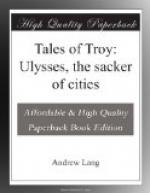Then Priam praised his wisdom, and all men betook them to bed, but the bright Dawn rose unwillingly next day, to throw light on the battle where her son was to risk his fife. Then Memnon led out the dark clouds of his men into the plain, and the Greeks foreboded evil when they saw so great a new army of fresh and unwearied warriors, but Achilles, leading them in his shining armour, gave them courage. Memnon fell upon the left wing of the Greeks, and on the men of Nestor, and first he slew Ereuthus, and then attacked Nestor’s young son, Antilochus, who, now that Patroclus had fallen, was the dearest friend of Achilles. On him Memnon leaped, like a lion on a kid, but Antilochus lifted a huge stone from the plain, a pillar that had been set on the tomb of some great warrior long ago, and the stone smote full on the helmet of Memnon, who reeled beneath the stroke. But Memnon seized his heavy spear, and drove it through shield and corselet of Antilochus, even into his heart, and he fell and died beneath his father’s eyes. Then Nestor in great sorrow and anger strode across the body of Antilochus and called to his other son, Thrasymedes, “Come and drive afar this man that has slain thy brother, for if fear be in thy heart thou art no son of mine, nor of the race of Periclymenus, who stood up in battle even against the strong man Heracles!”
But Memnon was too strong for Thrasymedes, and drove him off, while old Nestor himself charged sword in hand, though Memnon bade him begone, for he was not minded to strike so aged a man, and Nestor drew back, for he was weak with age. Then Memnon and his army charged the Greeks, slaying and stripping the dead. But Nestor had mounted his chariot and driven to Achilles, weeping, and imploring him to come swiftly and save the body of Antilochus, and he sped to meet Memnon, who lifted a great stone, the landmark of a field, and drove it against the shield of the son of Peleus. But Achilles was not shaken by the blow; he ran forward, and wounded Memnon over the rim of his shield. Yet wounded as he was Memnon fought on and struck his spear through the arm of Achilles, for the Greeks fought with no sleeves of bronze to protect their arms.
Then Achilles drew his great sword, and flew on Memnon, and with sword-strokes they lashed at each other on shield and helmet, and the long horsehair crests of the helmets were shorn off, and flew down the wind, and their shields rang terribly beneath the sword strokes. They thrust at each others’ throats between shield and visor of the helmet, they smote at knee, and thrust at breast, and the armour rang about their bodies, and the dust from beneath their feet rose up in a cloud around them, like mist round the falls of a great river in flood. So they fought, neither of them yielding a step, till Achilles made so rapid a thrust that Memnon could not parry it, and the bronze sword passed clean through his body beneath the breast-bone, and he fell, and his armour clashed as he fell.




